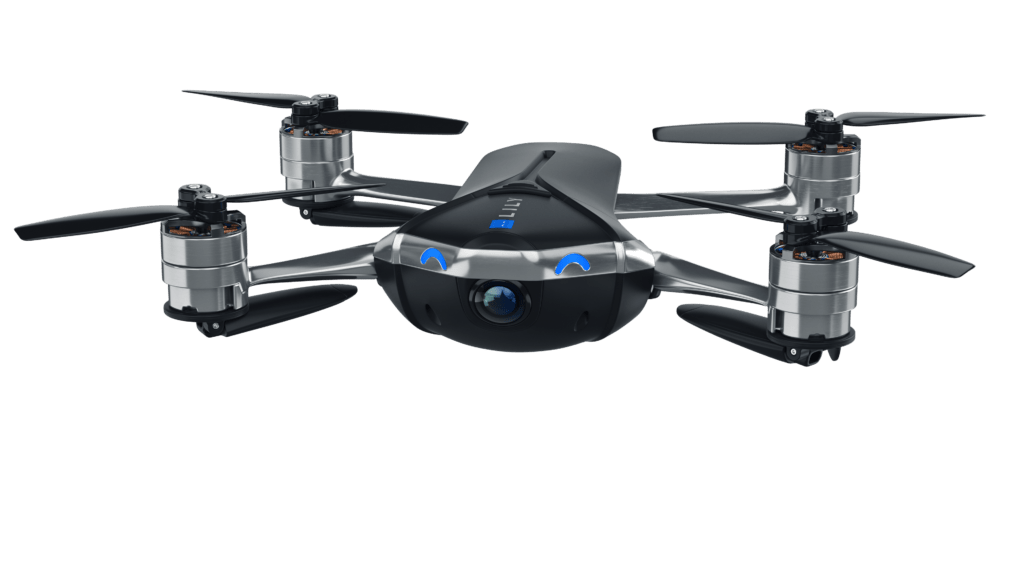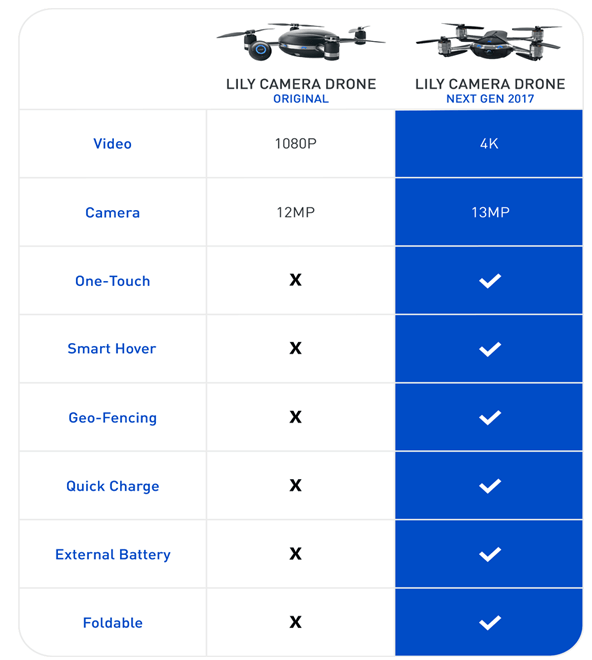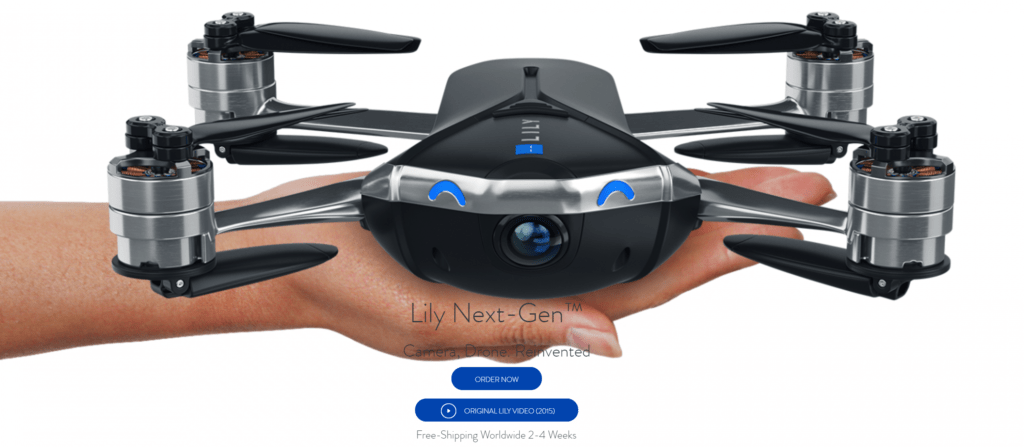Back in January, news came through from Lily Robotics that many had feared: after months of delays, huge investment and plenty of false promises, the company was folding and not a single customer would be receiving what they had paid for. Less than a year on, the Lily drone is back on the market and back from the dead. How?
In January 2017, Lily Robotics promised a full refund of the $38.4 million it had received from 61,450 customers. It’s estimated that around half of that number have been paid back so far, and although Lily has just about enough to commit to fulfilling the entire promise, there are plenty of other creditors looking to get what they’re owed, too.
The original promotional video for Lily was misleading and is still on display on the Lily homepage, despite new ownership and the new product having different features:
In June, it emerged that Lily Robotics had successfully auctioned off what was left of the company for $750,000.
The remaining assets were bought by two parties: LR Acquisition – which paid $450,000 for Lily’s patents, technology and prototypes of the doomed drone – and a second party, drone company Mota, which purchased Lily’s branding rights – including the trademark and the customer list – for $300,000.
Interestingly, GoPro, one manufacturer still looking to compete in the consumer market with DJI, offered $250,000 for the drone patents alone in one unsuccessful bid.

So What is Mota Doing With the Branding Rights?
You can understand why GoPro came in with a bid for the patents. Although the Lily never made it to market, working prototypes had come to fruition and even if the technology wasn’t perfect, it was something.
The matter of the branding rights is more peculiar. It’s not immediately obvious why a drone manufacturer would want to align itself with a brand synonymous with failure, malpractice and unreliability. For the thousands of people who paid to pre-order the Lily that never arrived, you’d imagine that seeing the brand come back to life would be a sure way create anger and tension pretty quickly.
Regardless, Mota has decided to re-purpose the Lily brand with its own new drone. There are three benefits to this. First, as part of the auction, Mota bought the customer information of those who committed to the Lilt campaign. That’s a valuable collection of names for any drone manufacturer. Second, the branding rights appear to have included Lily’s social media platforms, which have substantial audiences – even if they are made up of unsatisfied, angry customers.
And third, the publicity alone that will arise from taking over the Lily trademark will probably bring more attention than Mota’s products usually receive.
So it does make sense. It’s just a little strange that the brand has been taken over without much of a word as to how it happened. The result is a new Lily drone, the Lily Next-Gen, which is already available to order and will ship from Mota within one month.

Any confusion between the what and the who behind the new Lily drone is cleared up in the FAQs on the website:
What happened to the original Lily Robotics Project?
The original Lily drone was a crowdfunding project that unfortunately did not succeed. Mota Group acquired assets of Lily and created this drone based on the very same basis Lily was on: Simplicity, Function, and Making a Difference. We also improved the functions significantly. We are just getting started!
What is Mota Group?
Mota Group is a American company headquarter’ed in San Jose, California. We have been in business since 2003 (way before even big players such as DJI) and have solid foundation of drones and robotics industry. This allows us to fully integrate latest and safest technology into the product and provide a product that industry can count on.
The New Lily Drone
So what does the new Lily Next-Gen offer pilots previously burned by the Lily brand? For starters, its specs appear to have been upgraded compared with the original drone:
The Lily Next Gen is now foldable, capable of filming in 4k and has a smart hover function should the pilot lose connection. It can also track a subject and take off with one touch.
The ‘Fully Loaded Package’ is now available on the Lily drone website for $799, although customers who order one before September 1st will receive $300 off their purchase. There’s also a standard package available:
|
LILY Camera Drone – Next Gen 2017 – Fully Loaded Package
|

Although that seems like an amazing deal, we’d hold off any orders until we’ve seen footage of the drone in flight and had more details about its features and capabilities. The website at the moment doesn’t provide much, although we are expecting a press release and a proper launch in the next few days.
New Owners, Same Poor Communication?
So far, posts on (until recently) dormant social media accounts advertising the new Lily drone have understandably received an angry backlash. Plenty of customers still haven’t received refunds and are assuming that somehow Lily is back on its feet and advertising new products despite the money it owes.
We know that’s not the case of course – the Mota Group has no responsibility for clearing the debt of those who used to own the Lily trademark.
However, the company hasn’t been very forthcoming so far about the adoption of Lily’s branding or what its new drone doesn’t include, which in this context, is significant. So far, this is about all we’ve had:
Part of the reason that Lily went under was that it over-promised on functionality and couldn’t handle the demand that ensued from a misleading promotional video. Two of these functions: the ability to take off in mid-air and having a waterproof outer case, are nowhere to be found in the new Lily Next Gen. That, in itself, is not a problem. But perhaps the communication could have been better?
Clearly, no manufacturer is obliged to set out what its drone cannot do. But in this case, clarification might have been a good idea, especially considering the history of the brand and how subtly its ownership has changed hands. And especially considering the misleading promotional video that led to so many pre-orders for the original campaign is still on the website homepage.
Perhaps that clarification will come when the drone is officially launched in the next few days. But seeing as it’s already up for sale, the lack of communication so far represents a bad start for a brand in search of redemption.
Malek Murison is a freelance writer and editor with a passion for tech trends and innovation. He handles product reviews, major releases and keeps an eye on the enthusiast market for DroneLife.
Email Malek
Twitter:@malekmurison
Subscribe to DroneLife here.







[…] approached customers who had already been let down and offered them hefty discounts on the new Lily Next-Gen. The Mota Group incentivized sales with the promise of share options ahead of the company’s […]